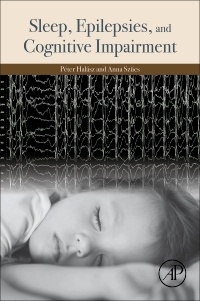Description
Sleep, Epilepsies, and Cognitive Impairment
Authors: Halasz Peter, Szucs Anna
Language: English
Subject for Sleep, Epilepsies, and Cognitive Impairment:
Keywords
Absence epilepsy; Arousal parasomnias; Atypical rolandic epilepsy; Autosomal dominant nocturnal frontal lobe epilepsy; Circadian cycle; Continuum of uni- and bilateral temporal lobe participation; Corticothalamic system; Early infantile epileptic encephalopathy; Electrical status epilepticus in sleep; Epilepsy as derailment of brain plasticity; Epileptic encephalopathies; Epileptic networks; Extreme epileptic sleep activation cognitive impairment; Genetic photosensitivity; Genetically determined
174 p. · 15x22.8 cm · Paperback
Description
/li>Contents
/li>Readership
/li>Biography
/li>Comment
/li>
Translational research connects science and clinical medicine from "the bench to the bedside." In Sleep, Epilepsies and Cognitive Impairment, the authors look back from the bedside to the brain function underlying clinical symptoms and reveal mechanisms explored by contemporary neuroimaging and signal analysis in the overlapping fields of sleep and epilepsy. This book will help the reader to see epilepsy from a new viewpoint.
The common pathophysiology binding together the diverse manifestations of epilepsies is the exaggeration of plastic functions of the brain involving the hippocampus, the non-specific thalamocortical system and the perisylvian cognitive network. Epileptic derailment seems to be the price for the latest achievements of the mammal and human brain; namely the highly developed ability to change and learn. The contemporary results of sleep research provide new viewpoints to explain why sleep and epilepsy are bedfellows. Converging evidence supports the concept that one of the most important biological roles of NREM sleep is the renewal of synaptic balance ensuring learning ability from one day to the next and consolidation of new memories. Epilepsy and NREM sleep use overlapping structures and functions, therefore epilepsy beginning in early childhood may interfere with sleep plastic functions. NREM sleep, which affects original learning and memory, may become the hidden source of chronic cognitive impairment when epilepsy occurs during sleep and blocks the plastic processes.
Sleep, Epilepsies and Cognitive Impairment abandons the academic classification of epilepsy by following the system epilepsy concept, binding major epilepsies with structures and functions of physiological brain systems. It tries to show within this system the close interrelationship between sleep, epilepsy and cognition.
Neuroscientists, clinical epileptologists and neurologists interested in brain processes underlying brain plasticity, sleep and epilepsy will find this book thought provoking. It offers good "brain-gymnastics" for reconsidering the ideas on epilepsy.
1. General considerations2. The network concept of epilepsy3. Activation of epilepsy in sleep4. Absence Epilepsy as system epilepsy of the sleep promoting function5. Nocturnal Frontal Lobe Epilepsy as epilepsy of the arousal system from sleep6. Juvenile Idiopathic Myoclonic Epilepsy as the common disorder of the cortoco-thalamic and motor system7. Reading Epilepsy as epilepsy of the speech function8. Medial Temporal Lobe Epilepsy as epilepsy of the limbic system of declarative memory processing 9. Peri-sylvian epileptic network: childhood idiopathic benign regional hyperexcitability (HIEC) conditions (Rolandic Epilepsy, Panayitopoulos syndrome)- Common features in HIEC conditions10. Malignant transformation of HIEC conditions to Electrical status Epilepticus in Sleep in global (ESES) and regional (Landai-Kleffner Syndrome) forms11. The spectrum disorders of the peri-sylvian epileptic network 12. Epileptic Encephalopathies (West Syndrome, Lennox-Gastaut Syndrome – Common features of Epileptic Encephalopathies13. The common mechanisms in childhood epileptic encephalopathies with immense sleep activation and cortical pathological HFO activity 14. The outstanding role of interictal dicharges (IEDs) in epileptic encephalopathies and in cognitive impairment of epilepsy15. The role of slow wave sleep in the development and progression in system epilepsies16. Epilepsy types in another way
Researchers and clinicians focused on neurology, neuroscience, sleep, and neurophysiology
Dr. Szucs is a neurologist and psychiatrist, and chief physician in the National Institute of Clinical Neuroscience. She is a sleep expert and neurophysiologist, as well as an author of 50 international publications and 2 books
- It provides contemporary knowledge about the neurophysiological and functional anatomical background of major epilepsies
- Treats major epilepsies as system epilepsies of brain networks
- Reveals the interrelationship of sleep, epilepsy and cognitive impairment showing how epileptic manifestations became facilitated in NREM sleep and interferes with sleep plastic functions
These books may interest you

Epilepsy in Children and Adolescents 146.79 €

Sleep: Evolution and Functions 105.49 €


